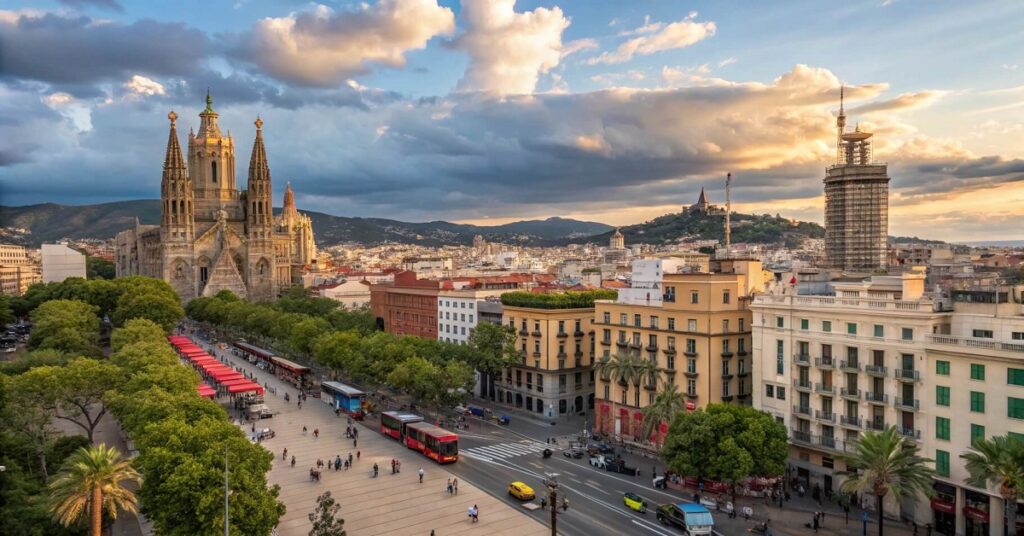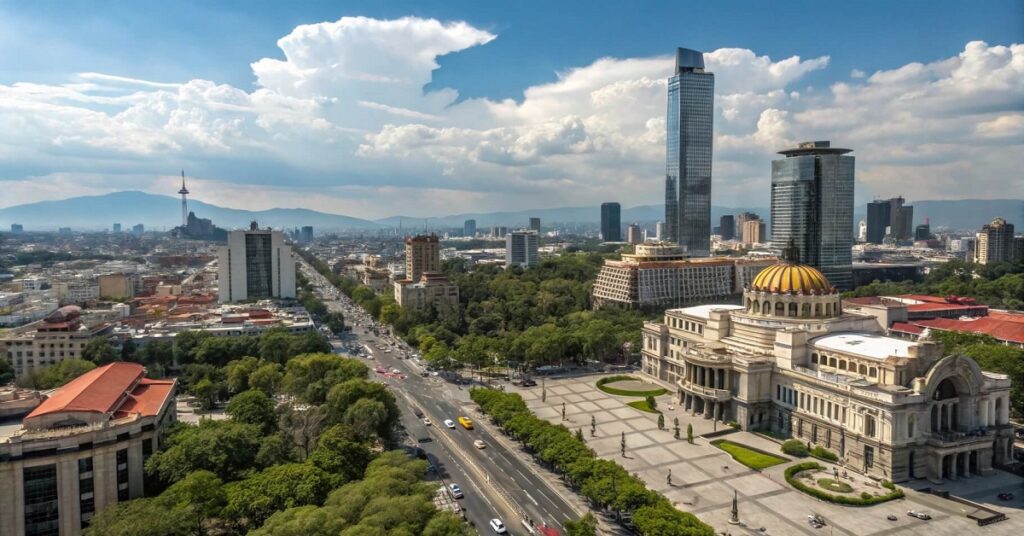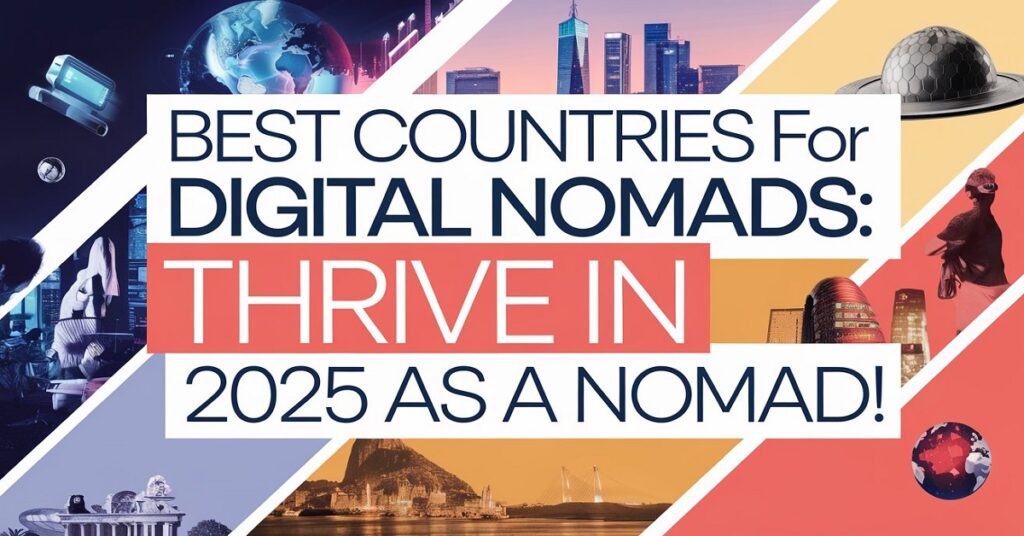Dreaming of ditching the 9-to-5 and working from paradise? In 2025, the world is your oyster. Discover the best countries for digital nomads in 2025, balancing adventure, affordability, and reliable internet. This article unveils the top destinations to launch your remote career, backed by data on cost of living, visa requirements, and digital nomad communities, empowering you to make an informed decision and start living your dream.
Table of Contents
Why Go Nomad in 2025? (The Benefits & Trends)
The digital nomad lifestyle isn’t just a trend; it’s a rapidly growing movement. By 2025, projections estimate that over 1 billion people will be working remotely, with a significant portion embracing location independence. Advancements in technology fuel this shift, increasing globalisation and a desire for greater work-life balance. A Global Workplace Analytics report shows a 400% increase in remote work since 2010 and projects continued growth in this trend.
Financial freedom and location independence are key advantages for digital nomads. You can earn in stronger currencies while living in countries with lower costs of living, significantly boosting your savings and financial security. For example, earning $5,000/month as a software developer provides a comfortable lifestyle in Chiang Mai, Thailand, whereas it might barely cover rent in San Francisco.
The landscape for digital nomads continues to develop. New visa options are emerging, existing nomad hubs are becoming more sophisticated, and tax regulations are adapting to the needs of remote workers. For updated insights into digital nomad trends, explore resources from MBO Partners
Top Contenders: Unveiling the Best Countries for Digital Nomads in 2025
Portugal: Your Affordable European Escape
Portugal consistently ranks as a top destination for digital nomads. It offers a compelling blend of affordability, quality of life, and modern infrastructure. Cities like Lisbon and Porto are vibrant hubs attracting remote workers from around the world.

Quick Facts Table:
| Feature | Details |
| Visa Options | Digital Nomad Visa, D7 Visa, Tourist Visa (Schengen Area) |
| Cost of Living (Monthly) | €1,200 – €1,800 |
| Internet Speed | 50+ Mbps (average) |
| Community | High |
Visa Options & Requirements: Portugal offers a Digital Nomad Visa that requires a minimum monthly income of €3,548 (as of January 2025). The D7 Visa is another option for those with passive income. Many nationalities can also enter Portugal visa-free for up to 90 days within the Schengen Area. Find out more information and how to apply at the official Portuguese Immigration website. You can also find helpful guides from reputable immigration law firms like Global Citizen Solutions.
Visa Options at a Glance:
- Digital Nomad Visa: The Income requirement is €3,548/month. Allows residency for up to 1 year, renewable.
- D7 Visa: For those with passive income (e.g., pensions, investments).
- Schengen Visa: Allows visa-free travel for 90 days within the Schengen Area.
Cost of Living Breakdown: According to Numbeo, expect to pay around €700-€1,200 for rent in Lisbon or Porto. Food costs approximately €300-€500 per month, while transportation and entertainment add another €200-€400. Compared to New York City, Lisbon is approximately 50% cheaper. Check out Nomad List for user-submitted data on the cost of living around the world.
Internet Connectivity & Infrastructure: Portugal boasts reliable internet infrastructure with average speeds exceeding 50 Mbps in most urban areas. Coworking spaces are readily available in Lisbon and Porto, offering professional work environments. Check out WeWork for coworking options in Lisbon.
Digital Nomad Community & Social Scene: Lisbon and Porto have thriving digital nomad communities. Meetup groups, Facebook groups (e.g., “Digital Nomads Portugal”), and coworking spaces provide ample opportunities for networking and socialising. Find digital nomad events on Meetup.
Pros & Cons:
- Pros: Affordable cost of living, vibrant culture, excellent internet, growing nomad community, easy European access.
- Cons: Can get crowded in tourist season, bureaucracy can be slow, finding long-term accommodation can be competitive.
Thailand – Your Budget-Friendly Asian Adventure
Thailand remains a perennial favorite for digital nomads seeking a budget-friendly and culturally rich experience. Cities like Chiang Mai and Bangkok offer a unique blend of affordability, delicious cuisine, and a thriving digital nomad community.

Quick Facts Table:
| Feature | Details |
| Visa Options | Tourist Visa (extendable), Smart Visa (for specific industries) |
| Cost of Living (Monthly) | $1,000 – $1,500 |
| Internet Speed | 30+ Mbps (average) |
| Community | Very High |
Visa Options & Requirements: Most nationalities can enter Thailand on a tourist visa, which can be extended for up to 60 days. The Smart Visa is another option for professionals in specific industries. As of 2024, Thailand is considering a dedicated Digital Nomad Visa; stay updated with the latest government announcements (link to Thai immigration website when available). For visa application assistance, consider using a visa service like Thai Visa Center.
Cost of Living Breakdown: Rent in Chiang Mai can range from $300-$600 per month for a comfortable apartment. Food is incredibly affordable, with meals costing as little as $2-$5. Expect to spend around $200-$400 per month on transportation and entertainment. Explore budget travel tips for Thailand from travel bloggers like Nomadic Matt.
Internet Connectivity & Infrastructure: Thailand has decent internet connectivity, especially in urban areas like Chiang Mai and Bangkok. Coworking spaces are abundant, offering reliable internet and professional work environments. Punspace is a popular coworking chain in Chiang Mai.
Digital Nomad Community & Social Scene: Chiang Mai is renowned for its vibrant digital nomad community. Numerous Meetup groups, Facebook groups (e.g., “Chiang Mai Digital Nomads”), and coworking spaces foster a strong sense of community. Join the Chiang Mai Digital Nomads Facebook group
Pros & Cons:
- Pros: Extremely affordable, delicious food, vibrant culture, large nomad community, beautiful scenery.
- Cons: Air quality can be an issue (especially during the burning season), the language barrier can be challenging, and cultural differences require sensitivity. For insights on navigating cultural differences, read articles on Culture Crossing.
“Maria, a freelance writer living in Lisbon, shares her experience navigating the digital nomad visa process: ‘The visa process took about three months, and the biggest challenge was gathering all the required documentation. However, the lifestyle in Lisbon is worth the effort the cost of living is reasonable, the internet is fast, and the digital nomad community is incredibly welcoming.'”
Spain Your Cultured European Hub
Spain offers a captivating blend of vibrant culture, historical richness, and diverse landscapes, making it an attractive destination for digital nomads. From the bustling streets of Madrid and Barcelona to the relaxed vibes of Valencia and Seville, Spain caters to various lifestyles and preferences.

Quick Facts Table:
| Feature | Details |
| Visa Options | Digital Nomad Visa, Schengen Visa |
| Cost of Living (Monthly) | €1,500 – €3,000 |
| Internet Speed | 40+ Mbps (average) |
| Community | High |
Visa Options & Requirements: Spain offers a Digital Nomad Visa, allowing remote workers to reside in the country for up to one year, with the possibility of renewal https://www.exteriores.gob.es/. To qualify, applicants generally need to demonstrate a minimum monthly income of €2,763 or more, be employed by a company outside of Spain, or freelance with non-Spanish clients https://migrun.tech/. The Schengen Visa allows visa-free travel for up to 90 days within the Schengen Area for many nationalities. Check the Spanish Ministry of Foreign Affairs website for the most up-to-date information https://www.exteriores.gob.es/.
Visa Options at a Glance:
- Digital Nomad Visa: Requires a minimum income of €2,763/month. Allows residency for up to 1 year, renewable https://immigrantinvest.com/.
- Schengen Visa: Allows visa-free travel for 90 days within the Schengen Area.
Cost of Living Breakdown: The cost of living in Spain varies depending on the city and lifestyle. According to various sources, expect to pay around €800-€1,200 for rent in Madrid or Barcelona, though you can find cheaper options outside the city centre at https://www.xe.com/. Food costs approximately €300-€500 per month, while transportation and entertainment can add another €200-€400. Overall, a comfortable lifestyle in Spain can range from €1,500 to €3,000 per month https://www.holafly.com/. Nomad List provides user-submitted data on the cost of living in different cities.
Internet Connectivity & Infrastructure: Spain boasts reliable internet infrastructure, with average speeds exceeding 40 Mbps in most urban areas https://nomadico.io/. Coworking spaces are readily available in major cities like Madrid, Barcelona and Valencia, offering professional work environments: https://www.orience.com/. Check out WeWork and other coworking directories for options.
Digital Nomad Community & Social Scene: Major Spanish cities have thriving digital nomad communities https://www.thegoldenpartners.com/. Meetup groups, Facebook groups (e.g., “Digital Nomads Spain”), and coworking spaces provide ample opportunities for networking and socialising.
Pros & Cons:
- Pros: Vibrant culture, delicious food, excellent internet, growing nomad community, diverse landscapes, and European access.
- Cons: Higher cost of living compared to Southeast Asia or Latin America, bureaucracy can be slow, finding accommodation in popular areas can be competitive.
Testimonial:
“I’m a graphic designer from Argentina, and I’ve been living in Valencia for six months. The Digital Nomad Visa process was straightforward, and the community here is amazing. I love the relaxed atmosphere and the ability to work from a café by the beach.” – Sofia, Graphic Designer
Indonesia Your Tropical Island Paradise
Indonesia, an archipelago of over 17,000 islands, offers a captivating mix of natural beauty, rich culture, and affordability. Bali is the most famous destination, but other islands like Java, Lombok, and Sumatra offer unique experiences for digital nomads.

Quick Facts Table:
| Feature | Details |
| Visa Options | B211A Visa, e-Visa, Digital Nomad Visa (in development) |
| Cost of Living (Monthly) | $700 – $1,200 |
| Internet Speed | 20+ Mbps (average) |
| Community | Very High |
Visa Options & Requirements: Indonesia doesn’t currently have a dedicated Digital Nomad Visa, but a digital nomad visa is being designed to make remote workers’ stay in the country easier. Digital nomads often use the B211A visa or the e-Visa, which allows stays of up to 60 days and can be extended twice. Always check the latest regulations on the Indonesian Immigration website or with a visa service like the Thai Visa Center.
Cost of Living Breakdown: The cost of living in Indonesia is affordable. Rent in Bali can range from $300-$800 per month for a comfortable villa or apartment. Food is incredibly affordable, with local meals costing as little as $2-$5. Expect to spend around $200-$400 per month on transportation and entertainment. Overall, a monthly budget of $700-$1,200 can provide a good quality of life.
Internet Connectivity & Infrastructure: Internet connectivity in Indonesia can vary. Bali and Jakarta offer reliable internet, especially in coworking spaces and cafes. Other islands may have less consistent connections. Consider purchasing a local SIM card with a data plan for backup.
Digital Nomad Community & Social Scene: Bali has a very large and active digital nomad community, particularly in Ubud and Canggu. Numerous Meetup groups, Facebook groups (e.g., Bali Digital Nomads), and coworking spaces foster a strong sense of community. Jakarta and Yogyakarta also have growing nomad communities.
Pros & Cons:
- Pros: Affordable cost of living, stunning natural beauty, rich culture, large nomad community in Bali, delicious food.
- Cons: Internet connectivity can be unreliable in some areas, the rainy season can be challenging, and cultural differences require sensitivity.
Testimonial:
“I’ve been living in Ubud, Bali, for a year, and it’s been an incredible experience. The cost of living is so low, and the community is so supportive. I spend my days working from a coworking space, exploring rice paddies, and practicing yoga. It’s a dream come true.” – David, Software Developer
Georgia, Your Budget-Friendly Eurasian Gem
Georgia, located at the crossroads of Europe and Asia, is emerging as a popular destination for digital nomads because of its affordability, visa-free entry for many nationalities, and unique culture. Tbilisi, the capital, offers a vibrant mix of old-world charm and modern amenities.

Quick Facts Table:
| Feature | Details |
| Visa Options | Visa-free entry for many nationalities (365 days) |
| Cost of Living (Monthly) | $800 – $1,500 |
| Internet Speed | 30+ Mbps (average) |
| Community | Medium |
Visa Options & Requirements: Georgia offers visa-free entry for citizens of over 95 countries, allowing them to stay for up to 365 days. This makes it one of the easiest countries for digital nomads to settle in without visa hassles.
Cost of Living Breakdown: The cost of living in Tbilisi is relatively low compared to many Western cities. Expect to pay around $400-$800 for rent for a comfortable apartment. Food costs approximately $300-$500 per month, while transportation and entertainment add another $200-$400. A monthly budget of $800-$1,500 can provide a comfortable lifestyle.
Internet Connectivity & Infrastructure: Tbilisi has decent internet infrastructure, with reliable connections available in most cafes, coworking spaces, and accommodations.
Digital Nomad Community & Social Scene: Tbilisi has a growing digital nomad community. Facebook groups (e.g., “Digital Nomads Tbilisi”) and coworking spaces offer opportunities for networking and socialising.
Pros & Cons:
- Pros: Affordable cost of living, visa-free entry for many nationalities, unique culture, delicious food and wine, safe streets.
- Cons: The language barrier can be challenging, the digital nomad community is smaller than in other hubs, and infrastructure outside of Tbilisi may be less developed.
Testimonial:
“I’m a freelance web developer from Germany, and I’ve been living in Tbilisi for four months. The visa-free entry was a huge draw, and I’m amazed by how affordable it is to live here. The city is beautiful, the food is delicious, and the people are incredibly welcoming.” – Mark, Web Developer
Mexico, Your Culturally Rich North American Neighbor
Mexico offers an interesting blend of rich culture, stunning landscapes, and affordable living, making it an attractive destination for digital nomads. From the vibrant streets of Mexico City and Oaxaca to the beaches of Tulum and Playa del Carmen, Mexico caters to diverse preferences.

Quick Facts Table:
| Feature | Details |
| Visa Options | Tourist Visa (extendable), Temporary Resident Visa |
| Cost of Living (Monthly) | $1,000 – $2,000 |
| Internet Speed | 25+ Mbps (average) |
| Community | High |
Visa Options & Requirements: Most nationalities can enter Mexico on a tourist visa, which allows stays of up to 180 days. For longer stays, consider applying for a Temporary Resident Visa. Check the Mexican Embassy website in your country for the most up-to-date information.
Cost of Living Breakdown: The cost of living in Mexico varies depending on the location. Mexico City can be more expensive than other cities in Mexico but is still cheaper than major cities in the US or Europe. Expect to pay around $500-$1,000 for rent in Mexico City, while food costs approximately $300-$500 per month https://www.remitly.com/. Transportation and entertainment can add another $200-$400. A monthly budget of $1,000-$2,000 can provide a comfortable lifestyle.
Internet Connectivity & Infrastructure: Mexico has decent internet connectivity, especially in urban areas. Coworking spaces are readily available in Mexico City, Playa del Carmen, and other popular destinations.
Digital Nomad Community & Social Scene: Mexico City, Playa del Carmen, Tulum, and Oaxaca have thriving digital nomad and expat communities. Numerous Meetup groups, Facebook groups (e.g., “Digital Nomads Mexico City”), and coworking spaces foster a strong sense of community.
Pros & Cons:
- Pros: Rich culture, delicious food, affordable cost of living, diverse landscapes, large nomad community in certain cities.
- Cons: Safety concerns in certain areas, language barriers can be challenging, and bureaucracy can be slow.
Testimonial:
“I’m a freelance marketing consultant from Canada, and I’ve been living in Mexico City for nine months. I love the culture, the food, and the people. The cost of living is reasonable, and the digital nomad community is incredibly welcoming.” – Sarah, Marketing Consultant
FAQs About the Best Countries for Digital Nomads
What is a digital nomads visa, and which countries offer them?
A digital nomad visa allows remote workers to legally reside in a country for an extended period, typically ranging from 6 months to 2 years. Countries like Portugal, Spain, Croatia, and Estonia offer dedicated digital nomad visas with varying income requirements and application processes. These visas often come with tax benefits or exemptions. Find a comprehensive list of Digital Nomad Visas on VisaGuide.World.
How much money do I need to be a digital nomads?
The amount of money you need depends on your lifestyle and chosen destination. A budget of $1,500-$2,500 per month can provide a comfortable lifestyle in Southeast Asia or Latin America. However, expect to spend $3,000-$5,000 per month in Western Europe or North America. Consider also the visa income requirements (Portugal requires €3,548). For a budgeting template, explore resources from financial planning websites like NerdWallet.
Which Country Suits Your Nomad Lifestyle Best?
What are the best digital nomads jobs?
Popular digital nomad jobs include software development, freelance writing, graphic design, online marketing, virtual assistance, and online teaching. Ideal skills are those in high demand and performable remotely.Ideal skills are those in high demand and performable remotely. Consider your current skills and experience to identify suitable opportunities. Learn about top remote job platforms on FlexJobs.
How do I find accommodation as a digital nomads?
Use websites like Airbnb, Booking.com, and local property portals to find accommodation. Join digital nomads Facebook groups in your destination to find shared apartments or coliving spaces. Consider booking short-term accommodation initially to explore different neighborhoods. Explore coliving options on sites like Outsite.
How do I stay connected (internet) while traveling?
Invest in a reliable mobile hotspot or purchase a local SIM card with a data plan. Utilise coworking spaces that offer high-speed internet. Research internet speeds and coverage in your chosen destinations before you travel. Consider using an eSIM service such as Holafly for reliable and affordable internet connectivity. Learn more about eSIMs at Airalo.
What are the tax implications of being a digital nomads?
Tax implications vary depending on your citizenship, residency status, and the countries where you earn income. Consult with a tax professional specialising in digital nomad taxes to understand your obligations and optimise your tax strategy. Consider FEIE and FTC. Find resources on international taxation from the IRS.
Thriving as a Digital Nomad: Essential Tips & Resources
Setting up your remote business for success involves choosing the right legal structure (e.g., LLC), opening a business bank account, and implementing a reliable invoicing and payment processing system (e.g., PayPal, Stripe). Ensure you are compliant with local regulations in both your home country and your chosen destination. LegalZoom offers resources for setting up a business.
Managing your finances and taxes as a nomad requires careful planning and discipline. Create a budget, track your expenses, and explore tax-saving strategies like the Foreign Earned Income Exclusion (FEIE). Consider using budgeting apps and consulting with a tax advisor specializing in international taxation. Check out services from Greenback Expat Tax Services.
Staying healthy and productive on the road is crucial for long-term success. Invest in comprehensive travel insurance, research healthcare options in your destinations, and maintain a consistent routine that includes exercise, healthy eating, and sufficient sleep. World Nomads offers travel insurance for digital nomads.
AI tools can significantly streamline the work of digital nomads.
- Language Translation: Tools like Google Translate and DeepL help overcome language barriers and communicate effectively with locals.
- Project Management: Platforms like Asana and Trello keep you organised and on track with your projects.
- SEO/Content Creation: AI-powered tools such as Surfer SEO and Jasper.ai can assist with keyword research, content optimisation, and generating engaging content ideas.
- Personal Finance Management: Apps like Mint and Personal Capital help track expenses, manage budgets, and monitor investments.
Common Nomad Mistakes & How to Avoid Them
Ignoring visa requirements and overstaying can lead to serious legal consequences. Many assume they can just hop borders to reset visas; this may not be true and could lead to being banned from re-entry. Example: Sarah overstayed her Thai tourist visa, resulting in a hefty fine and a temporary ban from the country. Solution: Thoroughly research visa requirements, apply for extensions in advance, and consult with local immigration lawyers if needed.
Underestimating the cost of living is a common pitfall. Don’t just rely on online estimates; research actual costs in your chosen destination, including rent, food, transportation, and entertainment. Example: Mark assumed Bali would be incredibly cheap but was surprised by the high cost of imported goods and tourist activities. Solution: Create a detailed budget, factor in unexpected expenses, and track your spending closely.
Neglecting cybersecurity and data protection can expose you to significant risks. Working from public Wi-Fi networks can make you vulnerable to hackers and cybercriminals. Example: Lisa had her credit card details stolen after using an unsecured Wi-Fi network in a cafe. Solution: Use a VPN, enable two-factor authentication, and be cautious about clicking on suspicious links. Protect your data using a VPN service like NordVPN.
Failing to build a community can lead to loneliness and isolation. The nomad lifestyle can be isolating if you don’t make an effort to connect with others. Example: John felt isolated and depressed after months of traveling solo without building meaningful connections. Solution: Join digital nomad communities, attend meetups, and participate in social activities. Find online communities on platforms like Reddit.
Underrated Nomad Destinations
Medellin, Colombia:
It offers a vibrant culture, affordable living costs, and a growing digital nomad scene. Known as the “City of Eternal Spring” for its pleasant climate.
Budapest, Hungary:
A beautiful European city with thermal baths, rich history, and a relatively low cost of living compared to Western Europe.
Valencia, Spain:
A more relaxed and affordable alternative to Barcelona, with beautiful beaches, delicious paella, and a thriving cultural scene.
Conclusion
The digital nomad lifestyle offers incredible freedom and opportunity, but it requires careful planning and preparation. By choosing the right country, managing your finances wisely, and building a powerful community, you can thrive as a location-independent professional.
Ready to start your nomad journey? Subscribe to our newsletter for exclusive tips and destination guides! Share this article with your fellow wanderlusters! What country is calling your name? Leave a comment below!
Disclaimer: This article is for informational purposes only. Consult a tax professional before making financial decisions. Some links may be affiliate links, meaning we earn a small commission at no extra cost to you.
About the Author:
Franklin is a travel writer and digital nomad who has lived and worked remotely in over 5 countries. He is passionate about helping others achieve location independence and create fulfilling lives on the road.


Nice blog here Also your site loads up fast What host are you using Can I get your affiliate link to your host I wish my web site loaded up as quickly as yours.
Hi Yetişkin,
Thanks for the feedback. I’m using Hostinger here’s my affiliate link if you’d like to check them out: Link Let me know if you have questions about setup or performance.
Best,
Franklin